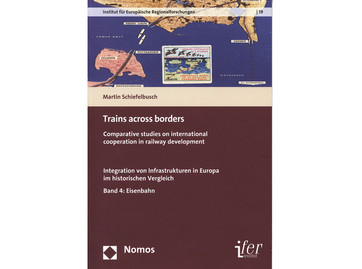Trains across borders

Comparative studies on international co-operation in railway development
By Dr Martin Schiefelbusch
Reflecting that 'rail is today the mode of transport most negatively affected by the existence of borders within Europe', despite the Schengen agreement and a long history of co-operation, this book sets out to 'provide insights into the international dimension of the railway business'.
Based on work sponsored by the German Research Foundation since 2008, it is one of a series of studies looking at integration and international governance in various infrastructure fields. The aim was to understand how the current situation came about and learn lessons which could contribute to future transport policy.
Sections looking at the evolution and purpose of international rail transport, and the rethinking of international passenger services in the 1970s, are followed by case studies looking at specific infrastructure projects and a discourse on the role of ticketing to facilitate seamless travel.
A final reflection on the process of integration points out that standardisation of networks requires an interdependence of technical and operating standards, and that once-integrated networks can often separate again in response to external and commercial pressures.
ISBN 978-3-8487-0855-0
€54 from Nomos Verlagsgesellschaft, Baden-Baden, Postfach 10 03 10, 76484 Baden-Baden, Germany
